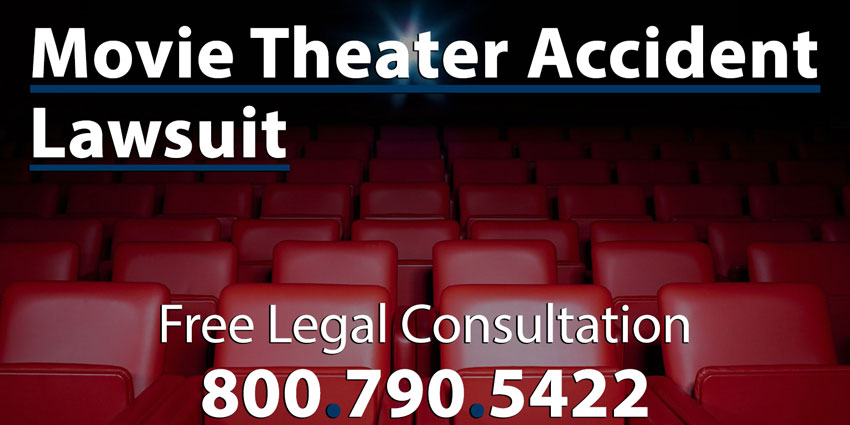
When people attend their local movie theatre to see the next big Blockbuster, hardly ever do they expect to suffer a life-changing injury. Unfortunately, moviegoers experience slip and fall accidents more often than many may be willing to believe. From loose carpeting to dark aisles, movie theatres pose a significant risk that is often overlooked. However, when these accidents occur, and visitors experience significant injuries they are often unsure of their rights as injured patrons. Fortunately, if you or a loved one were injured in an accident at a movie theatre, you have every right to pursue legal action against the theatre staff or owners. At Normandie Law Firm our Los Angeles movie theatre trip and fall lawyers can guide you through the process of building a case, filing a claim, and reaching a satisfactory settlement for your case. If you have any questions after reading this article, please feel free to reach out to our law offices in Los Angeles for a free consultation from one of our legal advisors.
Trip and Fall & Slip and Fall accidents at Movie Theatres
Slipping and falling or tripping and falling at a movie theatre can be an incredibly traumatic and life-changing experience. Slip and fall accidents can cause injuries that range from minor scrapes and bruises to life-threatening injuries like brain damage, and spinal cord injuries. These accidents can cause more than just physical trauma as well. To put it simply, hospitalization can be expensive, and if your injuries put you out of work for a significant amount of time, the accident can result in further monetary damages. For this reason, victims of slip and fall accidents at movie theatres have every right to file a movie theatre accident lawsuit against the staff, managers, or property owners responsible.
If you slipped and fell at a movie theatre, it is crucial to your case that you can identify the injuries that you endured. Listed below are some of the common injuries that victims of slip and fall and trip and fall accidents experience:
- Head Injuries: Head injuries can range from minor contusions (or brain bruising) to more severe traumatic brain injuries or TBIs. Some TBIs can cause ongoing seizures, mood changes, cognitive impairment and other debilitating symptoms. In most cases, head injuries require emergency room treatment, or hospitalization and in more severe cases can result in death.
- Hip Fractures: Hip fractures often require surgery and extended hospitalization. In some more severe cases, surgery may be necessary to implant an artificial hip. Out of every five hip fracture patients, one of them dies due to their injuries
- Back and Spinal Cord Injuries: Injury to the spinal cord can lead to permanent paralysis, temporary paralysis and other severe neurological and sensory impairments
- Shoulder Injuries: slip (trip) and fall accidents can result in shoulder dislocations or more severe forms of shoulder injuries called brachial plexus injuries. The brachial plexus is a network of nerves that connect the shoulder, arm, and hand to the spinal cord. These injuries are often treated with surgery followed by extensive physical therapy
- Sprains and Fractures: The force of slipping and falling can cause minor to severe bone injuries. In some cases, the impact of the ground could cause minor sprains, in others; it could cause debilitating bone breakage that may result in temporary disability. Some of the common fractures that victims suffer include hip, spine, forearm, leg, ankle, pelvis, upper arm and hand.
As well as being able to identify the injuries caused by accident, it is critical that you can show how the accident occurred. At movie theatres and multiplexes, there could be a wide variety of reasons why you tripped or slipped and fell. While the cause can vary drastically from case to case, we’ve included some of the common hazards that can occur at movie theatres:
- Loose carpeting causing a trip hazard
- Floors wet from spilled refreshments
- A movie theatre being too dark so potential hazards can’t be avoided by patrons
- Food on the floor creating a slip and fall hazard
- Damaged movie theatre steps, causing a trip hazard
If you suffered a slip and fall or trip and fall accident from one of the following causes, or any other cause similar, you might be eligible to file a movie theatre or multiplex accident injury lawsuit against the property owners. However, the process of doing so can be incredibly challenging, and as such, it is in your best interest to seek legal guidance from a multiplex or movie theatre accident injury attorney.
How To File A Slip and Fall or Trip and Fall Accident Lawsuit Against A Movie Theater
The process of suing for an injury that you sustained at a movie theatre can be somewhat challenging as there are some legal hurdles you must first overcome before reaching a satisfactory settlement. However, don’t let that deter you. Under premises liability law, movie theatre owners and staff should be held liable for the damages of an accident caused by their negligence or misconduct. Premises liability states that property owners should be held responsible for any damages caused on their property that resulted out of their negligent actions. Property owners are expected to provide a certain level of safety and security for their patrons, when there is a failure to meet this expectation, those injured as a result of this failure can sue for the damages. Bulleted below is the basics involved in a premises liability case:
- There was a hazardous condition or potentially dangerous condition on the property, like broken carpeting, or a damaged step, that presented an unreasonable risk of harm.
- The property owner, or movie theatre owner, should have been aware of the dangerous condition
- The movie theater or property owner failed to either warn guests of a reasonable condition and did not take reasonable action to remedy the issue.
- The hazardous condition resulted in the injury of a tenant or patron.
If you wish to file a lawsuit against a movie theatre, you want first to report your accident as soon as possible. The sooner you report your accident to the management or property owners; the less likely the defense attorneys will be able to dispute the legitimacy of your claims. With reporting the accident, you should also collect as much evidence as possible. In cases of this nature, the potential evidence could include testimonies from those who witnessed the accident, medical records detailing the injuries you endured, and any photographs that show the hazard which caused your injuries.
This evidence can then be used to prove the negligence of the movie theatre owners, management, or staff. While every claim of negligence is different depending on the case, every claim follows a particular structure. Listed below is the basic structure of a claim of negligence:
- Duty: The plaintiff (injured or damaged party) must be able to show that the defendant (movie theatre owners or staff) owed a legal obligation to the plaintiff under the particular circumstances of the case.
- Breach: The plaintiff must be able to show that the defendant breached said legal duty through specific actions or failure to act appropriately
- Causation: The plaintiff must be able to prove that the defendant’s actions or lack thereof caused the plaintiff’s injuries
- Damages: The plaintiff must be able to show that they endured some specific damages. This aspect can usually be shown through the presentation of medical records, a loss of wages, or a loss of potential income.
When filing your case, it is essential that you are aware of the statute of limitations. The statute of limitations is a state-mandated period that every injured party has to bring their case to court. If you fail to meet the statute of limitations, you will more than likely have your case dismissed from court. As mentioned, the statute of limitations can vary depending on the state, and as such, it is incredibly important that you consult an attorney that understands how the statute of limitations influence personal injury cases in your particular state. The statute of limitations has some exceptions as well, that should be taken note of when moving forward with your case. Listed below are some of the common exceptions involved in movie theatre slip and fall accident cases:
- The Defendant was out of State for a period: If a defendant was absent from the state, the statute of limitations pauses until the defendant returns.
- The plaintiff is a minor: If the injured party is a minor, meaning below the age of 18, the statute of limitations does not run until the said minor turns 18.
- Mental incompetence of the plaintiff: If a plaintiff is judged as mentally incompetent during their injuries or the actions of the defendant, then the statute of limitations are paused throughout this incompetence.
- Death of the plaintiff: If a plaintiff dies before the statute of limitations runs its course, then a lawsuit can still be filed in the statute of limitations period. However, if six or fewer months remaining on the statute of limitations at the time of the plaintiff’s death, then the suit must be filed within six months of the plaintiff’s death.
- Plaintiff’s prison sentence: If a plaintiff is imprisoned, California law dictates that the statute of limitations is tolled until the plaintiff is released, or for two years whichever comes first.
- Plaintiff’s Military Service: If a plaintiff is serving in the military the statute of limitations is automatically tolled for the entire duration of the plaintiff’s service.
Regardless of the aspects of your movie theatre slip and fall accident case, it is in your best interest that you seek legal guidance from an attorney experienced in movie theatre trip and fall and slip and fall accidents. With the right attorney by your side, you can more likely reach a satisfactory outcome for your case.
How Normandie Law Firm Can Help
 Slipping and falling at a movie theatre or multiplex can be an incredibly damaging and traumatic experience. Fortunately, if you were injured at a movie theatre as a result of a slip and fall accident, you may be able to collect significant monetary compensation for your damages. However, when filing these kinds of lawsuits it, is in your best interest to seek assistance from an attorney who can sue the parking lot. At Normandie Law Firm our Los Angeles lawyers experienced in movie theatre slip and fall accidents are committed to ensuring our clients receive all the resources they require to earn the compensation that they deserve their damages. If you file a claim with our law firm, you could find some if not all of the following damages compensable to you:
Slipping and falling at a movie theatre or multiplex can be an incredibly damaging and traumatic experience. Fortunately, if you were injured at a movie theatre as a result of a slip and fall accident, you may be able to collect significant monetary compensation for your damages. However, when filing these kinds of lawsuits it, is in your best interest to seek assistance from an attorney who can sue the parking lot. At Normandie Law Firm our Los Angeles lawyers experienced in movie theatre slip and fall accidents are committed to ensuring our clients receive all the resources they require to earn the compensation that they deserve their damages. If you file a claim with our law firm, you could find some if not all of the following damages compensable to you:
- All of you medical and hospitalization costs
- All of your future medical care and treatment
- A loss of income and loss of future earnings due to long-term recovery or permanent disability due to the accident
- Compensable economic damages include loss of property or damaged property.
- Compensable non-economic damages include emotional distress, trauma, PTSD resulting from the accident, pain and suffering and anxiety.
Victims of slip and fall or trip and fall accidents at movie theatres, and have any further questions regarding how to collect monetary compensation, feel free to reach out to our law offices. While our law firm is based in Los Angeles, our attorneys also practice in Oakland, San Francisco, San Diego, Sacramento, Orange County, Riverside, Fresno, and throughout the state of California.
Free Second Opinions
Other attorneys will sign you up for their firm but will disappear once your name is on the paper as they are busy signing up more cases. In these instances, their business is based more on volume and will attempt to sign up as many cases as possible. In turn, they will spend less time on cases resulting in severely reduced settlements. Our firm will not treat you like a number. We will be in communication with you throughout our lawsuit and will treat you like family. So if you already have an attorney don’t worry, we’ll give you a second review of your case 100% free of charge.
Zero Fee Guarantee-No Upfront Fees Ever
If you contact our law offices today, we can walk you through the complicated process of filing your claim completely free of charge. As a show this commitment to you and your case we offer our clients the benefits of a zero fee guarantee policy. Under our zero fee policy, all clients don’t pay for our services until their case is won. If you feel in need of a second opinion, second opinion case reviews are also free under this policy. Please, feel free to give us a call, and we can guide you down the path of receiving proper compensation for your damages.











